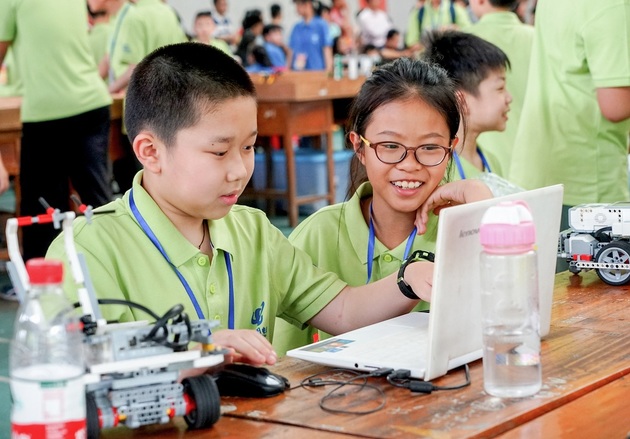
Photo/Dfic
Mar. 12 (NBD) – "Everyone in this country should learn how to program a computer, because it teaches you how to think", said Apple founder Steve Jobs, and his teaching is taking effect in China.
At the beginning of 2019, two top players in kids' programming education, Codemao and XiaoMa.Wang, announced new rounds of financing. According to public data, currently in China there are over 160 companies that provide coding education to kids, nearly 60 of them revealed the funding they received.
A research report estimated that by October 2018, China's market of coding education for minors was 3 billion yuan (446.9 million U.S. dollars) to 4 billion yuan (595.9 million U.S. dollars), covering a customer base of 15.5 million, and predicted that the scale of the industry will reach 30 billion yuan (4.5 billion U.S. dollars) in five years.
Afraid of missing the next "unicorn" start-up, renowned investment firms including Sequoia Capital China, ZhenFund Inc, Sinovation Ventures have made their deployment in this sector. At a time of "capital winter" when venture capital funding is slowing in China, the booming segment of kids' programming education is one of the few exceptions.
Apart from sales pitch about how AI is the future and how coding will improve children's learning ability, the fast rising of kids' programming education is also backed by favorable policies. The State Council issued a blueprint for the development of AI in 2017, which specifically advised setting up AI-related courses in K12 education, promoting coding education, and encouraging the development of teaching software and games by non-government entities.
Provinces and cities including Zhejiang, Tianjin and Jiangsu incorporated coding into high-school IT curriculum or even the college entrance exam.
Though favored by investors and policies, kids' programming education has challenges to be dealt with. One urgent problem is the lack of qualified teaching staff.
On several recruitment platforms, the job requirements for coding teachers are college degrees and certain understanding of operation system and coding languages, and over half of the positions sampled do not require teaching experience.
For computer professionals, the IT industry is more attractive; besides, it’s hard for a computer talent to teach coding without proper training, said Li Tianchi, founder and CEO of Codemao, to NBD.
Some parents say the Scratch courses offered by many training institutes are not coding in the strict sense, but more like games that give introductory exposure of coding to children.
Another shortcoming is the lack of standardization. Unlike English and mathematics training schools that have mature curriculum developed over the years, the kids' programming education industry does not have widely recognized textbooks, authoritative and unified evaluation system, or sound course design.
Last but probably the biggest challenge is how to win children over from other extra-curriculum institutes. The time and energy of a child is, after all, limited.
Wenwen, a first grade pupil from Shanghai, has stuffed her weekend with tutoring of English and mathematics, as well as training of painting, piano playing, dancing and news writing. Her mother told NBD that Wenwen doesn't have time for coding classes.
Xu Yisong, an entrepreneur who started his own coding school, said when considering education products outside of school, most parents would prioritize tutoring of school disciplines, then well established hobbies like piano and painting. New things such as coding are the last one to consider.
The prospect of kids' coding education cannot be underestimated in the long term, but it cannot be overestimated in the short term, said Wang Xinxi, a commenter of the technology,media and telecom sector.
Email: limenglin@nbd.com.cn


 川公网安备 51019002001991号
川公网安备 51019002001991号





